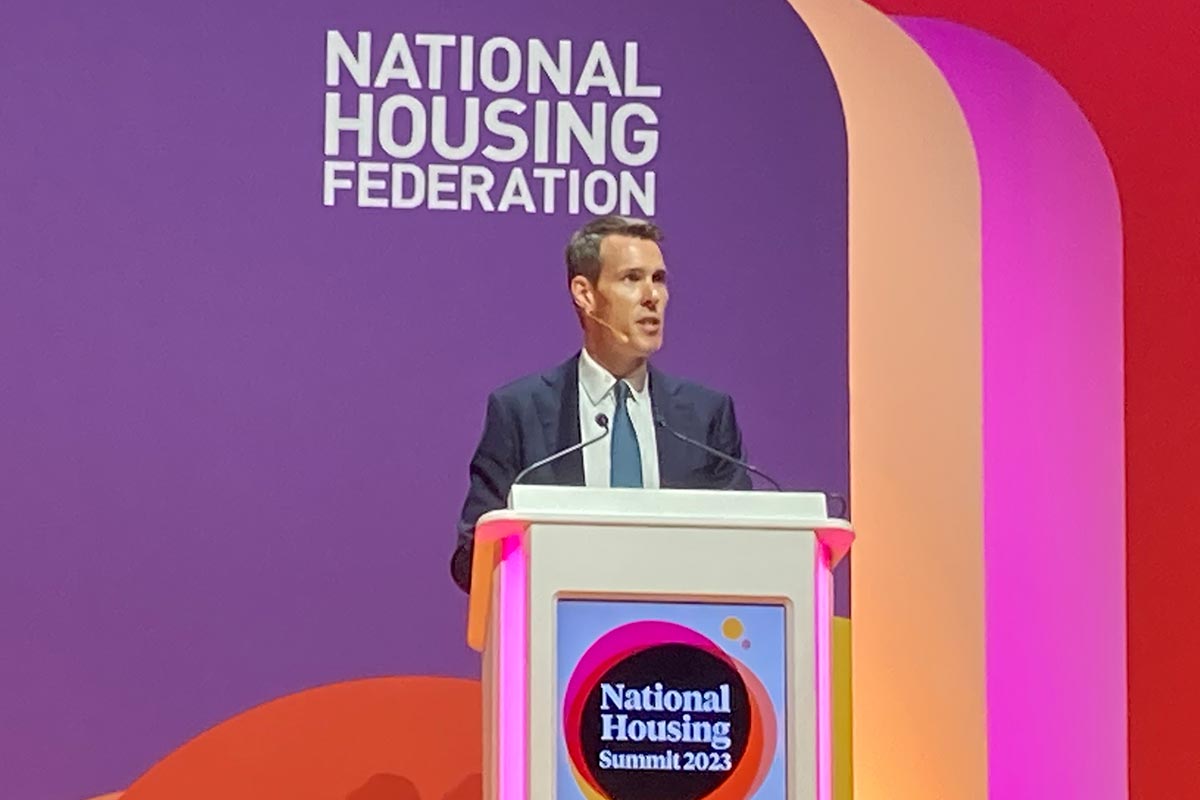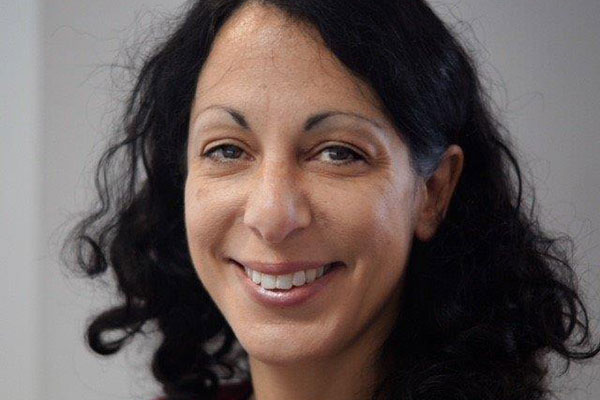Dispatches from the NHF Summit 2023
The great and good of the housing sector descended on Birmingham this week to discuss the key issues impacting their world. James Riding, Kath Swindells and Grainne Cuffe recap the key points
The National Housing Federation (NHF) Summit in Birmingham is a fixture in the social housing sector calendar – an opportunity for leaders to get together to discuss, debate and learn about the latest developments affecting their businesses.
As ever, Inside Housing was present in the throng of delegates at the International Convention Centre (ICC), and there was much to report from the two days of talks.
From new(ish) housing ministers to those who would become them, and familiar debates about damp and mould and consumer regulation standards, the key talking points left us with clearer ideas about where we are and where we are going.
The most important are described below.
‘We should all be a bit more like Bob’
Kate Henderson, chief executive of the National Housing Federation, opened the summit on Monday with a tribute to the “tremendous career” of Lord Bob Kerslake.
A former head of the civil service, Lord Kerslake was chair of Peabody until his death in July. In the House of Lords, he led a successful rebellion against the government’s 2015 social housing reforms, which included the forced sale of council homes.
“Bob knew and valued the importance of a safe, secure, affordable home,” Ms Henderson said. “We should all be a bit more like Bob.”
Ms Henderson’s call for a “long-term plan” for housing was heard by housing minister Rachel Maclean, who followed her onto the stage and told the audience: “We agree.”
However, when asked by chair Lewis Goodall what would be different about housing policy after another five years of Conservative government, she seemed genuinely not to have considered the possibility. “Goodness gracious, you are going so far into the future,” she said. “I don’t agree with the premise of your question.”
Also conspicuous was the fact that she did not pick up on Ms Henderson’s strong words for meddling ministers: “Politicians need to stop the piecemeal tinkering and contradictory reforms that have happened over the past decades.”
In one area, at least, she need not have worried about sweeping reform: the minister revealed that she was only getting around to “thinking about” encouraging local planning authorities to prioritise social rent homes. In your own time…
‘A painstaking and laborious effort’

With eyes turning towards a general election and a new shadow housing secretary, Angela Rayner, the summit was an opportunity for Labour to flesh out its plans for social housing. Matthew Pennycook, shadow housing minister, began his speech with the grim portent that ending the housing crisis would be a “painstaking and laborious effort”.
In the manner we have come to expect from Labour leader Sir Keir Starmer’s team, expectations of brisk sweeping reform were managed.
Mr Pennycook’s central pledge was that a Labour government would reach ‘net positive’ social rent homes early in its term, ie it would build more social rent homes a year than are sold off or demolished.
This would be achieved by focusing the Affordable Homes Programme on the supply of new social rent and lowering Right to Buy discounts to reduce the volume of sales.
There is currently a net annual loss of 14,000 social rent homes, so achieving the ambition would be a step forward – but only so far.
Inside Housing is backing calls for 90,000 new social rent homes a year, which Mr Pennycook said he was “not sure can be done” in one parliament. A charitable reader might say that at least shows long-term thinking.
Streets apart

“Never blink when you’re in negotiations with private developers.”
That was West Midlands mayor Andy Street’s advice to attendees of the panel on devolution, as he explained the strategy that has enabled the combined authority to be “the only place in the country achieving our housing target” and get an affordable housing rate of “over 30%”.
He said that national targets and a clear national policy framework are helpful in helping regions achieve progress.
But the work is far from over, he admits, with “limited progress” on social rent development, a fact he is confident will be remedied by the trailblazer deal agreed earlier this year.
Since the deal was announced, Mr Street says he has had a “litany of housing associations” reaching out looking to collaborate.
He praised the relationship between the Labour and Conservative councils of the region, as did Helen Simpson, chair of York & North Yorkshire Local Enterprise Partnership. But she warned that it will take work to preserve that relationship: “We need to not let the run-up to the election destroy that partnership.”
When attendees voiced concerns that the recent news of Birmingham City Council’s bankruptcy could impact the ability of local authorities and devolved regions to access government funding, Mr Street was quick to emphasise that “the Birmingham situation is a tragedy… but it is a unique situation” and that it was up to regions to prove they deserve the trust of central government.
The squeezed and sliding

Frontline homelessness services are seeing a growing new cohort of the “squeezed and sliding”, Emma Haddad, chief executive of St Mungo’s, told audience members at a panel on homelessness.
While her service has also supported those with complex needs, they are now seeing a rising number of people who are working, but “can’t keep accommodation”.
And while more people are being made homeless, she said it is becoming “harder and harder” to get out, driven by the lack of housing.
She placed the blame on the lack of investment in social and affordable housing, and said that the current scale of the crisis meant services like St Mungo’s could only focus on crisis support, and not on prevention.
In its upcoming report, she said, the charity is calling for the next government to increase the supply of housing, raise the Local Housing Allowance, and change the process of getting support, but “it’s gonna take a bit of guts”.
Assurance is key

“If you’d asked Rochdale this time last year what their damp and mould situation was like, they will probably have said ‘we haven’t really got a problem’,” Kevin Brady, new(ish) chair of the landlord whose failure led to the death of two-year-old Awaab Ishak, told the summit.
Rochdale Boroughwide Housing (RBH) is now halfway through a 100% stock condition survey, one part of its improvement plan following the inquest into Awaab’s death.
With still half left to be surveyed, it has learned that 22% of its 13,000 homes need some level of damp and mould remediation.
Having assurance on everything related to a landlord – from stock condition to tenant vulnerabilities – was raised at several sessions.
During a session on ‘what quality really means’, Kate Dodsworth, chief of regulatory engagement at the Regulator of Social Housing, said the best responses to its call for evidence on damp and mould last year were “those who really understood the condition of homes that tenants were living in and were able to marry up that with a deep knowledge of who was living behind the door”.
“Not only that, but boards had a really good oversight of some of those issues,” she said.
“Those landlords that really understand their tenants’ needs and married that up with the comprehensive understanding of the homes that people are living in, which I don’t think is a huge ask for asset-owning businesses to understand the current condition of homes that they have.”
During his session, Mr Brady said that RBH’s previous board was assured when it shouldn’t have been, relying too heavily on external bodies, including the regulator.
The regulator gave RBH a G1 grading for governance a year after Awaab’s death, despite knowing about it a month after it happened.
Mr Brady said: “All too often in the past, certainly the experience in Rochdale would suggest that they had an over-reliance on the external assurance from third parties.
“And I would include the regulator in that, in that the board quite clearly took comfort from the fact that it had got the G1/V2 and actually it’s not the regulator’s job to provide assurance to boards. It’s up to the board to find that assurance for themselves.”
During the session on quality, Richard Blakeway, the housing ombudsman, highlighted the importance of knowing tenants’ vulnerabilities.
The watchdog’s new Spotlight investigation is looking at what it means to be a vulnerable tenant in social housing after it saw landlords repeatedly “fail to fulfil their obligations around human rights”.
“Because sometimes we can have neat tramlines and if everyone fits in the box, that’s great, but when someone presents a case or a requirement, reasonable adjustments are not always being made, they’re not being recognised, they’re not being recorded, and they’re not being responded to. And those are real issues which that Spotlight report will look at.”
New consumer standards

The regulator recently published its proposed new consumer standards.
During her two sessions, Ms Dodsworth urged attendees to send in their responses to the ongoing consultation by 17 October.
The RSH is consulting on four revised standards designed to protect tenants and improve the service they receive: the Safety and Quality Standard, the Transparency, Influence and Accountability Standard, the Neighbourhood and Community Standard, and the Tenancy Standard.
These will replace the Home Standard, the Tenancy Standard, the Neighbourhood and Community Standard, and the Tenant Involvement and Empowerment Standard, and will apply to all housing associations and stock-holding councils.
Ms Dodsworth said the regulator will have a “definite statement” and code of practice on the new standards by February, ahead of their launch in April. Part of the new regulation on those standards includes inspections of landlords.
The RSH is currently undertaking its second wave of inspection pilots.
“The revisions you might argue aren’t hugely radical in terms of change from the current consumer standards that we have.
“But I think the radical change will be the fact that we are able to go out and proactively inspect and look for evidence of boards’ assurance against those standards.
“And for me, I think that’s where some of the step change in quality on some of these consumer issues is really going to come into force.”
Ms Dodsworth said the pilots show that consumer regulation “works”.
“We are able to go out there and do this and we are looking forward to doing this in April,” she said.
Sign up for our daily newsletter
Already have an account? Click here to manage your newsletters













